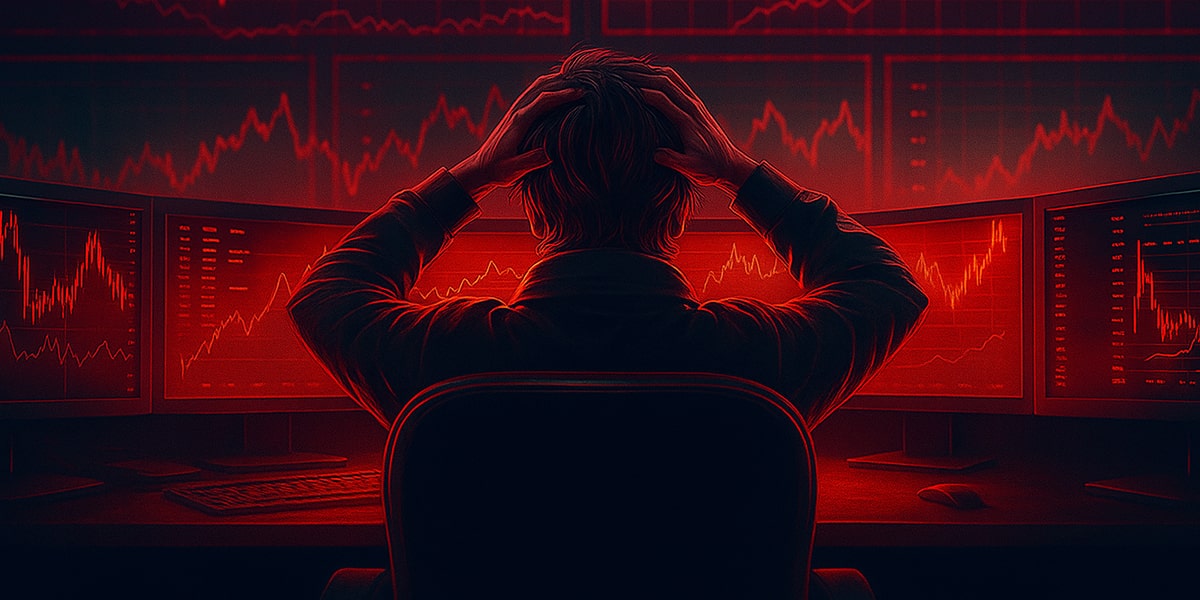26 August 2025
How to avoid mistakes in trading: top 10 tips for novice traders
Novice traders often make mistakes because they start trading without a thorough analysis. Therefore, it is very important to know the basic rules that will help you avoid such mistakes!
Most often, mistakes are related to a lack of knowledge and experience. This can be avoided by perseverance and perseverance in learning how to trade in financial markets!

Trading without a strategy or plan
The lack of a strategy or plan leads to capital losses. Beginners need to learn from successful traders and apply proven strategies. Therefore, the first step should be to study the features and patterns of the market, rather than blindly diving into practice.
Trading on emotions
It often happens like this: the price drops sharply, and in a panic you sell assets at a loss. Or, on the contrary, the market is growing rapidly, and you start buying at the top. The result is one loss.
How to avoid:
- ◉ Don't enter the market if you're angry, tired, or in doubt.
- ◉ Stick strictly to the plan and don't try to recoup immediately after failure.
- ◉ Before every trade, ask yourself the question: Why am I doing this? If there is no reasonable answer, it means that these are emotions.
Ignoring stop losses
Stop-loss orders were not created by chance: their use is the most important tool for capital protection. By placing them at a reasonable distance from key levels, the trader is able to significantly reduce losses.
Ignoring stop losses can lead to a quick series of bad trades and a complete loss of money.

Unreasonable expectations
This is both a mistake and an externally imposed illusion. Famous traders today have accounts on social networks, show achievements and teach how to trade correctly.
Dubious online courses promise easy earnings: you'll get rich with us. On the one hand, financial analysts warn that most traders are losing money, and on the other hand, they advise which indicators to put on the chart to catch the trend.
As a result, questions appear in the new trader's mind:
- ◈ If many people are losing money in the currency and stock markets anyway, why do we need these indicators? Maybe they just don't work?
- ◈ Or, on the contrary, if they do not provide any guarantees of profit, then why use them at all? After all, the probability of making money with or without them is about the same, isn't it? That means I can do it on my own and earn money in a couple of days!
The result is always the same: disappointment, losing trades, procrastination and a negative attitude towards the market. Any new hope for easy earnings is an almost guaranteed path to a dead end.
Lack of financial management
Money management is an element that should be built into any trading strategy by default. It involves both distributing the deposit between different strategies and gradually investing funds when entering an asset.
It is not necessary to purchase the entire planned volume of cryptocurrency in one transaction, because then there will be no way to average the entry price with a decrease in quotations. This mistake is especially often made by beginners, depositing the entire deposit at once.
Competent money management also includes the allocation of trading platforms and asset storage locations. Don't limit yourself to one exchange — use several. If the cryptocurrency does not participate in trading and just lies on the stock exchange, transfer it to a cold or hardware wallet.
Make money management a part of your strategy. Otherwise, ignoring this rule can lead to serious consequences.
Greed
You are already in profit, but you continue to wait for further growth. Suddenly, the price reverses, and earnings turn into losses.
How to avoid:
- ◉ Take profits in stages: for example, sell part of an asset when the price has reached the target level.
- ◉ Follow a simple rule: It's better to earn less than to lose everything.

Ignorance of the fundamentals of fundamental, technical and volume analysis
At first glance, this problem is solved simply: the Internet and bookshelves are full of publications promising quick earnings and millions in a year. However, the methods of famous traders and investors often contradict each other.
- ◆ Warren Buffett is convinced that investments should be concentrated, not diversified.
- ◆ Peter Lynch advises to refrain from buying during downturns.
- ◆ Jim Rogers believes that following a trend is not always the best strategy.
Obviously, there is no golden key or grail in trading. Success depends not only on the methods you choose, but also on how well they suit your style and level of training.
Mastering modern analysis tools and using them correctly will help you avoid typical mistakes.
Unwillingness to learn
Trading is a difficult job that requires effort, knowledge and skills. Everyone can master it, it all depends on individual abilities. There are many free materials available today. It is better to get acquainted with trading on such sources for the first time.
Useful courses can be found on educational platforms like Coursera or Udemy. Next, you should look at the sources on which these courses are based: the authors, as a rule, provide a list of materials. If there was a universal trading system or indicator, then everything would be much simpler.
If there was a universal trading system or indicator, trading would be much easier.
The study of theory should be combined with practice on a demo account or on a real account with minimal risks. Cent accounts are suitable for this, where beginners can experience all the psychological aspects of trading in as close to real conditions as possible.
Trading is a craft that everyone can learn. But, as in the case of driving a car, it is impossible to get behind the wheel without basic theoretical knowledge.
You should not rely only on intuition: there are enough educational materials on the Internet to at least master the basics of one of the trend detection methods.

The risks are too great
Excessive and unjustified risks inevitably lead to capital losses or deep drawdowns.
Too lazy to keep statistics
No professional trader can do without taking into account statistics and keeping records of their trades. Without this, it is impossible to objectively assess one's own effectiveness. Account analytics are done differently on different exchanges: somewhere at a good level, somewhere much worse, but everywhere the data is stored only for a certain period.
Over time, you will simply forget at what prices you created your investment portfolio and find yourself in a situation where you sell an asset without knowing whether you are closing a deal at a profit or a loss.
Keeping a trading journal can teach you more than a dozen trading books you've read. Write down the purchase price, date, stock exchange, reasons for entry, emotions during transactions, and other details.
After a while, you will be able to analyze your actions and find the causes of mistakes and successful solutions.͏

Conclusion
The mistakes of novice traders often lead to a complete loss of money. Avoiding such common mistakes can greatly increase a beginner's chances of success in trading. But constant learning and development remain the key to successful results.
It is important to first master the basics of trading cryptocurrencies, then learn how to analyze your trades, learn new strategies and tools. Novice traders should often attend training sessions, webinars, read books, and share their experiences with more knowledgeable colleagues.
Remember, trading is not a short-distance run, but a long one, and discipline and constant self-improvement play a key role in achieving stable results.


